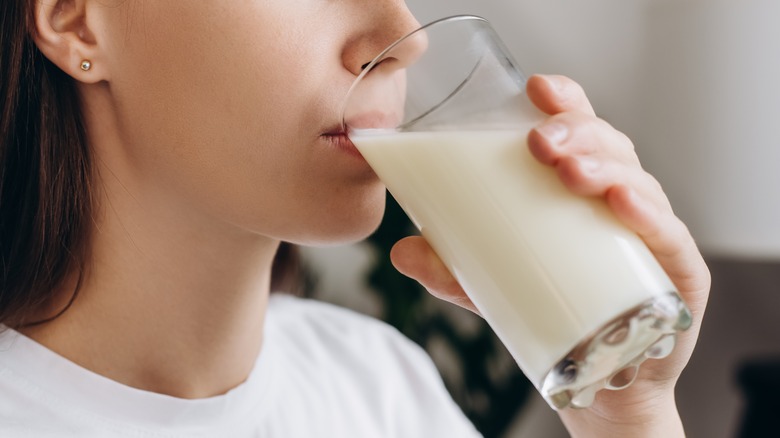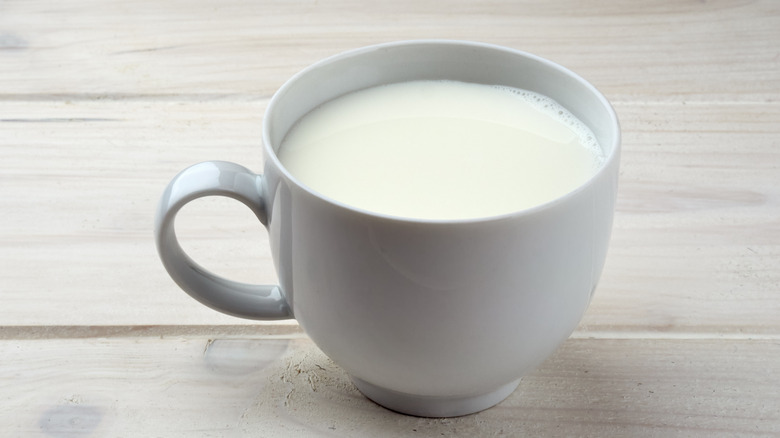Does Warm Milk Actually Help You Fall Asleep?
There's nothing worse than lying down in bed only to find that you're unable to sleep. What is one to do other than count sheep and hope that sleep eventually comes around? To fall asleep more easily, some people opt to take melatonin. Meanwhile, others swear by more old-fashioned remedies such as a glass of warm dairy milk. Warm milk is the age-old solution to making one drowsy, but is it a medical marvel or more of a myth?
The answer to that is a bit more complicated than it first appears, and researchers are split on whether warm milk makes one tired. Current research suggests that milk contains an amino acid — tryptophan — that promotes drowsiness. However, there isn't an exact correlation that warm milk before bed actually makes a difference. Likewise, this amino acid is present in milk even when it's cold, so it begs the question of why people prescribe warm milk instead of just milk in general.
Perhaps it's the psychology behind warm milk instead that makes it a potent sleep aid for some. This may explain why some swear by drinking warm milk before bed while it fails to work for others. Let's take a look at the science of what's inside that glass of milk.
The science behind warm milk
As mentioned above, milk contains an essential amino acid called tryptophan, according to the National Library of Medicine. Tryptophan promotes the creation of the chemicals melatonin and serotonin in the brain. Melatonin plays an important role in the body's natural sleep cycle, according to a 2017 study in Current Neuropharmacology. Meanwhile, Health Direct notes serotonin works with melatonin to control one's sleep cycle making it an important factor as well.
Additionally, milk also contains certain peptides (which are made of amino acids) that can act as natural stress relievers, according to the American Chemical Society. These peptides could be used in future sleep aids. However, there seems to be no evidence that these peptides found in milk will become more potent if the milk is warmed.
Even when it comes to tryptophan, researchers have pointed out that milk contains many other active ingredients that may counteract its efficacy. In an interview with Live Science, Lin Zheng and Mouming Zhao, researchers at the South China University of Technology, noted that "Tryptophan has to compete with other large neutral amino acids — like leucine, isoleucine, tyrosine, phenylalanine, and valine — to cross the blood-brain barrier to have any effects on sleep." So if it's not a chemical in milk — warm or cold — that makes one drowsy, then it may be psychosomatic instead.
The psychology behind warm milk
Drinking warm milk may conjure fond memories of childhood. It's a way to get cozy and comfortable, which may be why it's a popular method for falling asleep. The psychology behind warm milk may explain why it's an effective sleep aid. Warm milk may act as a placebo encouraging people to get tired because they believe that it works. According to National Geographic, placebos have been known to affect the body because they effectively trick the brain into believing something works as we hope it will.
This could also explain the warm milk phenomenon and why people swear by it. "[One] reason warm milk makes people sleepy is because it reminds you of the person who was kind enough to give it to you when you were younger," said Michael Breus, a clinical psychologist, in Live Science. Whether warm milk triggers a psychological or biochemical reaction that makes you sleepy isn't exactly understood at this point. Perhaps, it could be a mix of both — or neither.
More research is needed to properly rule one way or another on whether warm milk induces sleep or not. However, when it's time for bed, a warm glass of milk certainly doesn't hurt. At the very least, it will make you feel cozy, and you can even try drinking warm milk with a cookie.


